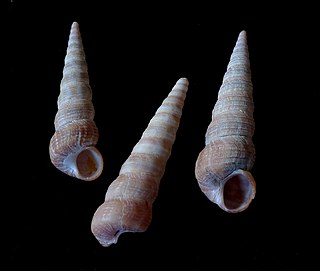
A spire is a part of the coiled shell of molluscs. The spire consists of all of the whorls except for the body whorl. Each spire whorl represents a rotation of 360°. A spire is part of the shell of a snail, a gastropod mollusc, a gastropod shell, and also the whorls of the shell in ammonites, which are fossil shelled cephalopods.

Physidae, commonly called the bladder snails, is a family of small air-breathing freshwater snails, aquatic pulmonate gastropod molluscs in the superfamily Lymnaeoidea.

Physella acuta is a species of small, left-handed or sinistral, air-breathing freshwater snail, an aquatic gastropod mollusk in the family Physidae. Common names include European physa, tadpole snail, bladder snail, and acute bladder snail. In addition, Physa acuta, Physa heterostropha and Physa integra are synonyms of Physella acuta.

Physa is a genus of small, left-handed or sinistral, air-breathing freshwater snails, aquatic pulmonate gastropod molluscs in the subfamily Physinae of the family Physidae.
The Snake River physa snail, scientific name Physella natricina, is a species of freshwater snail, an aquatic gastropod mollusk in the family Physidae. This species is endemic to Idaho in the United States.
The cave physa is a species of small, air-breathing, freshwater snail, an aquatic pulmonate gastropod mollusk in the family Physidae. It lives only in caves.

Physa fontinalis, common name the common bladder snail, is a species of air-breathing freshwater snail, an aquatic gastropod mollusc in the family Physidae. The shells of species in the genus Physa are left-handed or sinistral.

Ferussaciidae is a family of air-breathing land snails, terrestrial pulmonate gastropod mollusks in the superfamily Achatinoidea.

Mollusca is the second-largest phylum of invertebrate animals, after Arthropoda; members are known as molluscs or mollusks. Around 76,000 extant species of molluscs are recognized. The number of fossil species is estimated between 60,000 and 100,000 additional species. The proportion of undescribed species is very high. Many taxa remain poorly studied.
The Bauru Group is a geological group of the Bauru Sub-basin, Paraná Basin in Minas Gerais, São Paulo, General Salgado, Itapecuru-Mirim, Mato Grosso, Brazil whose strata date back to the Late Cretaceous. Dinosaur remains are among the fossils that have been recovered from the formation.

Freshwater snails are gastropod mollusks that live in fresh water. There are many different families. They are found throughout the world in various habitats, ranging from ephemeral pools to the largest lakes, and from small seeps and springs to major rivers. The great majority of freshwater gastropods have a shell, with very few exceptions. Some groups of snails that live in freshwater respire using gills, whereas other groups need to reach the surface to breathe air. In addition, some are amphibious and have both gills and a lung. Most feed on algae, but many are detritivores and some are filter feeders.

Physa skinneri, common name the glass physa, is a species of freshwater snail, an aquatic gastropod mollusc in the family Physidae.
Physa mezzalirai is a fossil species of extinct air-breathing freshwater snail, an aquatic pulmonate gastropod mollusc in the family Physidae. This species has a small and left-handed shell, as is always the case in this family. Physa mezzalirai dates from the Turonian to Santonian-aged Adamantina Formation, in São Paulo state, Brazil.

Pholadomya is a genus of saltwater clams, marine bivalve molluscs in the family Pholadomyidae.

Clausinella is a genus of marine bivalve mollusc in the family Veneridae.
Glyptophysa novaehollandica is a freshwater species of gastropod mollusk in the family Planorbidae.
Aridi is a surname mainly based in Mount Lebanon. Notable people with the surname include:








